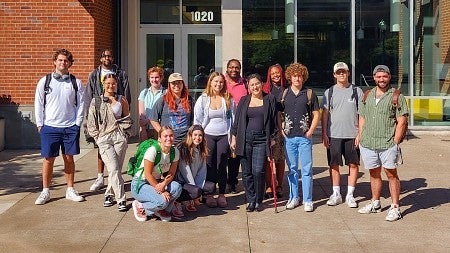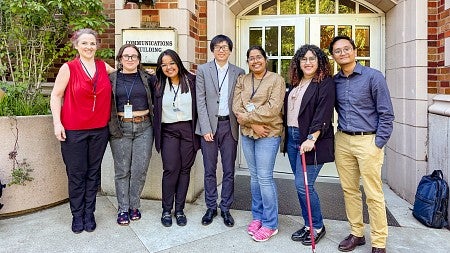When Nahla Bendefaa of Morocco was 17, she went on an exchange program to the United States and, on a whim, signed up for a class that altered her academic trajectory. She knew the high school credits she would earn in the U.S. wouldn’t transfer to her Moroccan school, so she took classes that seemed interesting to her — like photojournalism.
That class broadened her thinking about her future career and eventually led her to the UO School of Journalism and Communication’s (SOJC) Communication and Media Studies Ph.D. program.
“It was just super exciting,” she said about photojournalism. “I got a chance to meet a lot of people and do a lot of things that I had never really done before. I was quite introverted before that, and that was just an experience that pushed me outside of my comfort zone and made me realize that there's more out there than being an engineer or a doctor, which was kind of the two paths of a good student in Morocco.”
Bendefaa has since branched out to other areas of communication. Now in her second year as an SOJC Ph.D. student, she is researching the interactions between media institutions and government entities, and how political regimes can shape that relationship.

Interviewing journalists in Ghana
Bendefaa’s latest research explores how journalists in Ghana define their role in the media.
“I spent six weeks this summer interviewing both independent and investigative journalists as well as reporters in state-owned or private media institutions about what their professional practices are like and how that is shaped by the political regime in Ghana,” Bendefaa said.
To conduct this research, she participated in the SOJC’s Media in Ghana program, which matches students to internships in Accra, Ghana’s capital. In Accra she interned for the Media Foundation for West Africa, which helped her find journalists to interview for her research.
“It was an incredibly valuable collaboration because I know the subject matter I’m addressing is sensitive, and a lot of people are not going to trust this random person who is coming from a college town with that kind of information,” Bendefaa said. “Having the support of the Media Foundation was the stamp of approval I needed.”
Through her interviews for a project she is conducting alongside fellow Ph.D. candidate Ivy Fofie, Bendefaa found that the political system, government institutions and funding shape the role journalists play in Ghanaian society.
“Many of the journalists I spoke with expressed concerns over funding constraints, a growing list of news organizations funded by politicians, and impunity in the face of violence against journalists and media workers,” Bendefaa said.

How governments influence media in Morocco and the United States
Bendefaa chose to focus on the relationship between media and political regimes because of her own experience as a journalist working in Morocco. As she started freelancing in the U.S., she realized she was reporting stories differently from how she would in Morocco.
“There are so many more restrictions politically on what you can and can’t report on [in Morocco], and also legally as well, and that was kind of in the back of my mind,” Bendefaa said. “That really drove this whole project in terms of what does it mean to be a journalist in different political contexts, and is a journalist the same thing everywhere?
For example, when writing a story about rehabilitation programs for inmates with Ideastream, Bendefaa said that although she faced many roadblocks from the Ohio Department of Corrections, she never worried about her safety or her family’s.
“The same cannot be said about independent journalists in Morocco, who face a great deal of harassment from the state for just wanting to report the truth,” Bendefaa said. “In my personal experience, a lot of the reporting I did in Morocco was fluff pieces. Any of my pitches that steered away from that were shot down by editors.”
Bendefaa’s research is also influenced by her experience as an activist for Amnesty International, where she created an international youth strategy alongside an international team. The work allowed her to meet many people and even travel to London, a place she’d always dreamed of going.
“That work really inspires and influences a lot of the work that I am doing now,” she said. “My ability to adapt to different settings, to listen and learn from other people are all due to that intercultural exchange that I’ve been fortunate to have.”
Those skills have served her well, not just in her media research, but also in her role as a reporter and researcher for a public radio station in northeast Ohio, where she worked on a public education campaign during the COVID-19 pandemic.

Theory and practice at the SOJC
Bendefaa’s diverse and varied background — from journalism to activism and even corporate public relations — has been a good fit for the SOJC.
“I decided to come to the SOJC because of the interdisciplinary aspects that exist here,” she said, noting that a lot of other programs she looked into keep communication studies separate from public relations and mass communication.
“I have worked on so many different things, and I've also done a lot of corporate communications,” she said. “Something I really wanted from a Ph.D. program is the ability to both be a theoretician and a practitioner.”
In the future, Bendefaa plans to continue working in academia to pursue her passions for teaching and research while still practicing in some capacity, through either consulting or freelancing.
“I always say that I'm a better theoretician by being a practitioner and a better practitioner by being a theoretician,” Bendefaa said.
—By Ella Norton, class of ’25
Ella Norton (she/her/hers) is a third-year student majoring in public relations and French from Kansas City, Missouri. She is a copy editor for Align Magazine, an account executive for Allen Hall Public Relations and academic development chair for her sorority.
